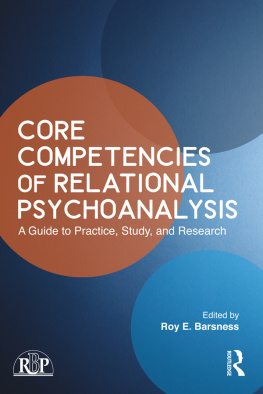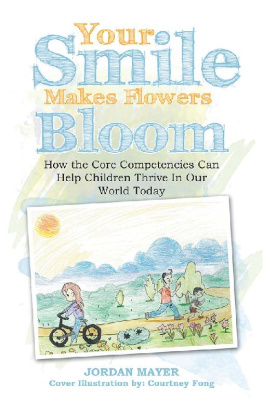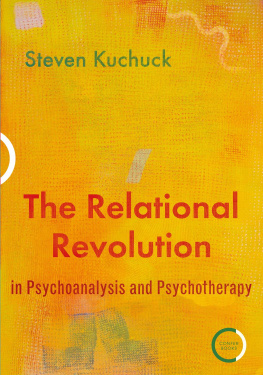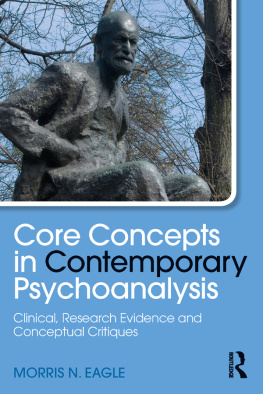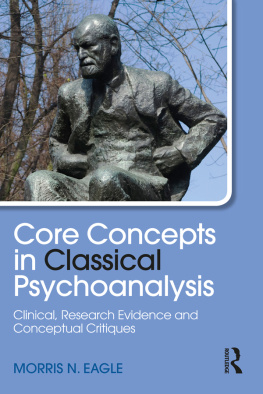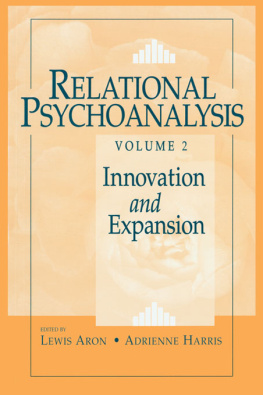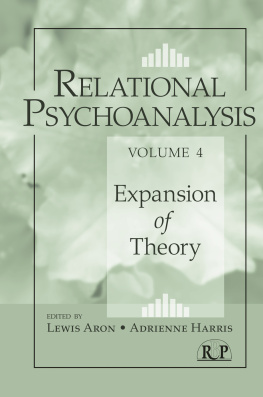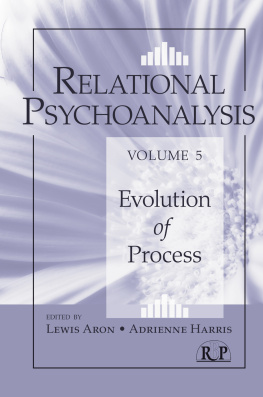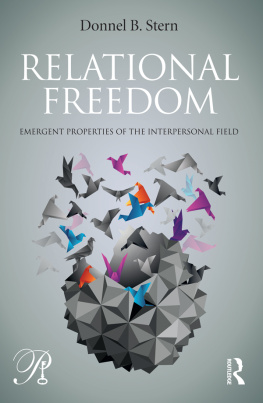Roy E. Barsness - Core Competencies of Relational Psychoanalysis: A Guide to Practice, Study and Research
Here you can read online Roy E. Barsness - Core Competencies of Relational Psychoanalysis: A Guide to Practice, Study and Research full text of the book (entire story) in english for free. Download pdf and epub, get meaning, cover and reviews about this ebook. year: 2017, publisher: Taylor & Francis (CAM), genre: Religion. Description of the work, (preface) as well as reviews are available. Best literature library LitArk.com created for fans of good reading and offers a wide selection of genres:
Romance novel
Science fiction
Adventure
Detective
Science
History
Home and family
Prose
Art
Politics
Computer
Non-fiction
Religion
Business
Children
Humor
Choose a favorite category and find really read worthwhile books. Enjoy immersion in the world of imagination, feel the emotions of the characters or learn something new for yourself, make an fascinating discovery.
- Book:Core Competencies of Relational Psychoanalysis: A Guide to Practice, Study and Research
- Author:
- Publisher:Taylor & Francis (CAM)
- Genre:
- Year:2017
- Rating:4 / 5
- Favourites:Add to favourites
- Your mark:
- 80
- 1
- 2
- 3
- 4
- 5
Core Competencies of Relational Psychoanalysis: A Guide to Practice, Study and Research: summary, description and annotation
We offer to read an annotation, description, summary or preface (depends on what the author of the book "Core Competencies of Relational Psychoanalysis: A Guide to Practice, Study and Research" wrote himself). If you haven't found the necessary information about the book — write in the comments, we will try to find it.
Roy E. Barsness: author's other books
Who wrote Core Competencies of Relational Psychoanalysis: A Guide to Practice, Study and Research? Find out the surname, the name of the author of the book and a list of all author's works by series.
Core Competencies of Relational Psychoanalysis: A Guide to Practice, Study and Research — read online for free the complete book (whole text) full work
Below is the text of the book, divided by pages. System saving the place of the last page read, allows you to conveniently read the book "Core Competencies of Relational Psychoanalysis: A Guide to Practice, Study and Research" online for free, without having to search again every time where you left off. Put a bookmark, and you can go to the page where you finished reading at any time.
Font size:
Interval:
Bookmark:
First published 2018
by Routledge
2 Park Square, Milton Park, Abingdon, Oxon OX14 4RN
and by Routledge
711 Third Avenue, New York, NY 10017
Routledge is an imprint of the Taylor & Francis Group, an informa business
2018 selection and editorial matter, Roy E. Barsness; individual chapters, the contributors
The right of the editor to be identified as the author of the editorial material, and of the authors for their individual chapters, has been asserted in accordance with sections 77 and 78 of the Copyright, Designs and Patents Act 1988.
All rights reserved. No part of this book may be reprinted or reproduced or utilized in any form or by any electronic, mechanical, or other means, now known or hereafter invented, including photocopying and recording, or in any information storage or retrieval system, without permission in writing from the publishers.
Trademark notice: Product or corporate names may be trademarks or registered trademarks, and are used only for identification and explanation without intent to infringe.
British Library Cataloguing in Publication Data
A catalogue record for this book is available from the British Library
Library of Congress Cataloging-in-Publication Data
A catalog record for this book has been requested
ISBN: 978-1-138-21836-9 (hbk)
ISBN: 978-1-138-21839-0 (pbk)
ISBN: 978-1-315-43777-4 (ebk)
Typeset in Times New Roman
by Keystroke, Neville Lodge, Tettenhall, Wolverhampton


This part covers:
- the research behind the Core Competencies;
- efficacy of the models;
- the history of relational psychoanalysis.
This part has been designed to offer the reader four points of entry into learning the Core Competencies:
- one-line naming of each Core Competency
- a brief introduction to each Core Competency
- properties of each Core Competency, offering categorical bullet points taken from the qualitative research that describes it;
- an in-depth essay on each Core Competency.
This part covers current issues relevant to contemporary practitioners, including:
- relational ethics;
- the brain and psychoanalysis;
- sexuality and gender;
- cultural considerations;
- self-care.
This part offers the reader a critique and a counter-critique of Relational Psychoanalysis, offering theoretical constructs that will continue to need revision, conversation, thoughtfulness, and thoroughness in order to continue to advance our field.
Self-Care
Roy E. Barsness & Anita Sorenson
As relational psychoanalytic theory has reworked historical models through a perspectival lens, the rules for practice have become less clear. As relational theorists turn from insight as the primary order of change to the reworking of early trauma within the therapeutic dyad, new techniques and clinical skills are required. But not only are new techniques and clinical skills necessary, skills in managing and understanding the analysts own intrapsychic and interpersonal world are imperative. As traditional psychoanalytic thought expands beyond interpretation as the ultimate instrument in psychoanalysis to the self of the analyst as primary instrument, we must pause and ask the question, What is the impact this shift has on the analysts self-esteem and capacity for self-regulation?
We will approach this question by attending to:
- the impact of the patient on the therapists self-esteem and self-regulation;
- how the therapists self-esteem is impacted by our external communities;
- the implications of the nature and personality of persons drawn to this work.
We then propose our perspectives on self-care, which offer assistance in holding on when at times we feel as though we are falling apart.
A supervisee with tears in her eyes says: I get so annoyed with myself. I constantly feel that I cant get this. I cant do what you do; I cant get to the metaphors, the underlying meanings, the process instead of the content, the What the hell is going on here anyway? question that you always encourage me to consider. I just cant think quickly enough.
She pauses, But what keeps coming back to me is that the only way to understand and assist my patient is through immersion into my own affects and experiences of my patient. I have to feel her to know her.
That is the only way. I respond, Yes.
We are quiet for a while as we consider the magnitude of what this involves. As we begin to speak, we acknowledge that indeed it is our selves that serve as the conduit, the midwife, the window to the deep of the other as we attend to what is being called up through the depth of our own being.
In relational psychoanalysis, it is expected and inevitable that the treatment will re-evoke aspects of the very experiences that contributed to early developmental difficulties (Beebe and Lachmann, 2014, p. 68). Slavin and Kriegmann argue that the evocation occurs within both patient and analyst, and therapeutic action is found in a mutual influence process suggesting that the therapist has to be changed by deepening her awareness of her own struggles that are parallel in some way to those of the patient, [Slavin, refers to this as] embodied simulation (Beebe and Lachmann, 2014, pp. 7374).
As you have read the preceding chapters, you have seen that the shibboleth of neutrality has been replaced by the principle of authenticity, privileging a heightened attention to the mutual intersubjectivity of the therapeutic encounter. In these chapters, we have come to see that the main instrument we have in our efforts to understand is our empathy, the main delivery system of our empathy is our person (McWilliams, in this volume), and Schore (2014) sums it up:
that the core clinical skills are right brain implicit capacities, including the ability to empathically receive and express bodily based nonverbal communications, the ability to sensitively register very slight changes in anothers expression and emotion, an immediate awareness of ones own subjective and intersubjective experience, and the regulation of ones own and the patients affect. All techniques sit atop this relational substratum .
(p. 394, italics added)
We are a long way from the days of abstinence, neutrality, and anonymity, when the self of the analyst was expected to be absent from the encounter. Now the analysts own personhood, the use of the self, is seen as central to change and transformation for the patient. There is no hiding or dissociating from countertransference reactions. In fact, as Bion has noted, the patient always knows what the analyst is thinking, and that this is the price the analyst pays for being an analyst (in Ferro, 2006, p. 661). The subjectivity of the therapist is central to understanding unconscious material, the structure of the intrapsychic and the patients interpersonal world. We no longer live in the myth of being unseen and unknown as helpful for the patient. Rather, we are required to pay disciplined attention to our thoughts and emotions and to have a keen awareness and acceptance of our deep emotional states and dissociations, in order to situate ourselves non-defensively, when activated by our patients fragilities and pathologies.
Font size:
Interval:
Bookmark:
Similar books «Core Competencies of Relational Psychoanalysis: A Guide to Practice, Study and Research»
Look at similar books to Core Competencies of Relational Psychoanalysis: A Guide to Practice, Study and Research. We have selected literature similar in name and meaning in the hope of providing readers with more options to find new, interesting, not yet read works.
Discussion, reviews of the book Core Competencies of Relational Psychoanalysis: A Guide to Practice, Study and Research and just readers' own opinions. Leave your comments, write what you think about the work, its meaning or the main characters. Specify what exactly you liked and what you didn't like, and why you think so.

